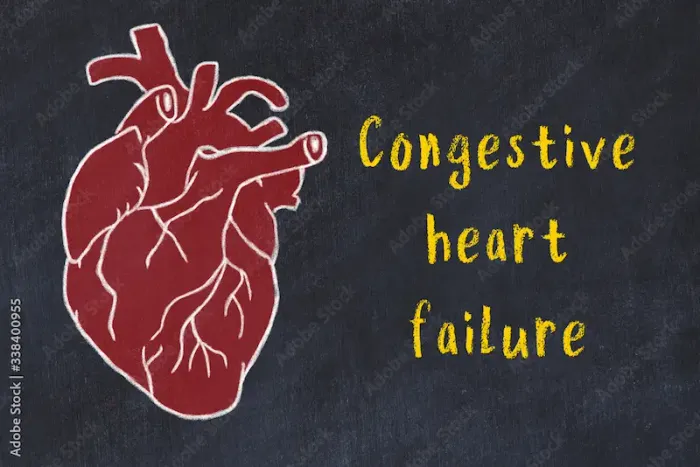Congestive Heart Failure Causes, Symptoms, and Modern Treatments
Learn about congestive heart failure (CHF), including its causes, symptoms, diagnosis, and modern treatment options for better management and quality of life.

Written by Dr. Siri Nallapu
Reviewed by Dr. Shaik Abdul Kalam MD (Physician)
Last updated on 13th Jan, 2026

Introduction
Congestive heart failure (CHF) sounds like a frightening, final diagnosis—as if the heart has stopped working entirely. But in reality, it describes a serious condition where the heart muscle isn't pumping blood as well as it should. This inefficiency causes blood and fluid to back up into the lungs, liver, abdomen, and legs, leading to a cascade of debilitating symptoms like severe shortness of breath and swelling. Affecting millions, CHF is a chronic, progressive condition that demands understanding and proactive management. This comprehensive guide will demystify what leads to congestive heart failure, break down its tell-tale symptoms, and explore the effective modern treatment strategies that can help you or a loved one live a longer, fuller life. Knowledge is the first step toward taking control of your heart health.
What is Congestive Heart Failure Exactly?
Congestive heart failure isn't a sudden cardiac event like a heart attack. Instead, it's a chronic syndrome that develops over time as the heart's pumping power grows weaker. Think of it not as the heart "failing" completely, but as a pump that can no longer meet the body's demands for oxygen-rich blood. This weakness triggers a compensatory response where the heart chambers may stretch to hold more blood or become stiff and thick. The body also retains salt and water to try and increase blood volume. While these are short-term fixes, they ultimately lead to the "congestion" that defines this condition—fluid accumulating where it shouldn't, causing the primary symptoms.
It's About Pumping Efficiency, Not Stopping
The key metric often used is ejection fraction (EF), which measures the percentage of blood pumped out of the left ventricle with each contraction. A normal EF is between 55% and 70%. In heart failure with reduced ejection fraction (HFrEF), the heart muscle is weak and doesn't pump effectively. In heart failure with preserved ejection fraction (HFpEF), the heart pumps normally but is too stiff to fill properly with blood. Both types result in inadequate blood flow to the body.
The "Congestive" Part: Where Fluid Builds Up
The congestion occurs because the weak pump can't keep up with the blood returning to the heart from the body. This causes pressure to build up in the system, forcing fluid from the blood vessels into the surrounding tissues. Where this fluid accumulates depends on which side of the heart is primarily affected. Left-sided failure leads to pulmonary oedema (fluid in the lungs), while right-sided failure causes peripheral oedema (swelling in the legs, ankles, and abdomen).
Recognising the Signs: Symptoms of Congestive Heart Failure
Symptoms can be subtle at first and are often mistaken for normal signs of ageing or being out of shape. However, early recognition is crucial for slowing the disease's progression.
Early Warning Signs You Shouldn't Ignore
• Shortness of breath (dyspnoea): Especially during physical activity or when lying flat. You may find yourself needing more pillows to sleep.
• Persistent coughing or wheezing: Often with white or pink blood-tinged phlegm, caused by fluid in the lungs.
• Fatigue and weakness: As less blood reaches your muscles and organs, you may feel unusually tired performing everyday tasks.
• Swelling (oedema): Noticeable swelling in the feet, ankles, legs, and fingers due to fluid retention.
Progressive Symptoms That Demand Immediate Attention
As CHF worsens, symptoms become more severe and require urgent medical care:
• Shortness of breath at rest: Inability to breathe comfortably even while sitting still.
• Paroxysmal nocturnal dyspnoea: Waking up gasping for air one to two hours after falling asleep.
• Rapid weight gain: Gaining 2-3 pounds in a day or 5 pounds in a week is a classic sign of fluid overload.
• Confusion or impaired thinking: Caused by changing levels of sodium and other substances in the blood.
• Increased heart rate: Your heart may beat faster to compensate for its lack of power.
Symptoms of Heart Failure in Elderly Patients
In older adults, symptoms can be atypical. Instead of classic shortness of breath, they may present with lethargy, dizziness, loss of appetite, or social withdrawal. This can sometimes lead to misdiagnosis, making it essential for caregivers to be vigilant.
The Root Causes: What Leads to Heart Failure?
CHF is typically the end result of other conditions that have damaged or weakened the heart over time. Understanding these root causes is key to both treatment and prevention.
Underlying Health Conditions That Damage the Heart
• Coronary artery disease (CAD) and Heart Attack: This is the most common cause. Narrowed arteries limit blood flow to the heart muscle, starving it of oxygen and weakening it.
• High Blood Pressure (Hypertension): Uncontrolled hypertension forces the heart to work much harder than normal to pump blood, eventually causing the muscle to thicken and become stiff or weak.
• Cardiomyopathy: This refers to diseases of the heart muscle itself, which can be caused by viral infections, alcohol abuse, or unknown factors (idiopathic).
• Heart Valve Problems: Faulty valves force the heart to work harder to keep blood moving in the right direction.
• Myocarditis: An inflammation of the heart muscle, usually caused by a virus, that can lead to left-sided heart failure.
• Diabetes: Diabetes significantly increases the risk of hypertension and CAD, both major contributors to CHF.
• Arrhythmias: Abnormal heart rhythms, especially if they are very fast or very slow, can weaken the heart.
Consult a Cardiologist for the best advice
Lifestyle and Environmental Risk Factors
While not direct causes, these factors greatly increase your risk:
• Smoking: Damages blood vessels, raises blood pressure, and reduces oxygen in the blood.
• Unhealthy Diet: A diet high in fat, cholesterol, and, crucially, sodium, contributes to hypertension and fluid retention.
• Obesity: Being overweight puts a significant strain on the heart.
• Sedentary Lifestyle: Lack of exercise contributes to other risk factors like obesity and hypertension.
• Alcohol and Drug Abuse: Excessive alcohol consumption and illicit drugs like cocaine can be toxic to the heart muscle.
How is Congestive Heart Failure Diagnosed?
Diagnosis involves a combination of a physical exam, a review of your medical history, and a series of tests to evaluate your heart's structure and function.
The Physical Exam and Discussing Your History
Your doctor will listen to your heart and lungs for signs of congestion (like crackles in the lungs), check your neck veins for distension, and press on your skin to check for oedema. They will ask detailed questions about your symptoms, their severity, and your family history.
Key Diagnostic Tests for Heart Function
• Blood Tests: A BNP (B-type natriuretic peptide) test is crucial. BNP is a hormone your heart secretes when it's under stress; high levels strongly suggest CHF.
• Chest X-ray: Shows if your heart is enlarged and can reveal fluid in your lungs (pulmonary oedema).
• Electrocardiogram (ECG/EKG): Records your heart's electrical activity to check for arrhythmias or signs of a past heart attack.
• Echocardiogram: This is the gold standard test. This ultrasound of the heart provides a video image, allowing doctors to see the heart's size, structure, motion, and, most importantly, its ejection fraction.
• Stress Test: Assesses how your heart performs under physical exertion.
If your doctor suspects an underlying issue, they may recommend further tests. Apollo24|7 offers convenient home collection for tests like BNP and other key biomarkers, making initial screening more accessible.
A Multi-Pronged Attack: Treatment for Congestive Heart Failure
Treatment aims to relieve symptoms, slow disease progression, and improve longevity. It's almost always a combination of approaches tailored to the individual.
First-Line Medications to Manage CHF
Medications are the cornerstone of treatment:
• ACE Inhibitors/ARBs/ARNIs: Relax blood vessels, lower blood pressure, and ease the heart's workload.
• Beta-Blockers: Slow the heart rate, reduce blood pressure, and limit the damaging effects of stress hormones on the heart.
• Diuretics ("Water Pills"): Help the kidneys remove excess fluid and sodium from the body, relieving swelling and shortness of breath.
• SGLT2 Inhibitors: A newer class of drugs, originally for diabetes, that have proven highly effective in reducing hospitalisation and death from CHF.
• Aldosterone Antagonists: Helpful in more advanced cases, they promote fluid loss and have protective effects on the heart.
Medical Devices and Surgical Procedures
For some patients, devices or surgery are necessary:
• Implantable Cardioverter-Defibrillator (ICD): A device that monitors heart rhythm and delivers a shock to stop life-threatening arrhythmias.
• Cardiac Resynchronisation Therapy (CRT): A special pacemaker that coordinates the contractions of the heart's lower chambers.
• Coronary Bypass Surgery or Angioplasty: To treat blocked arteries that are causing the heart failure.
• Heart Valve Repair/Replacement: To fix a faulty valve that is straining the heart.
• Ventricular Assist Devices (VADs): Mechanical pumps that help a weakened heart pump blood. They can be a long-term solution or a bridge to a heart transplant.
The Critical Role of Daily Lifestyle Changes
Self-management is non-negotiable for successful treatment for congestive heart failure:
• Sodium Restriction: Limiting salt intake is critical to preventing fluid retention. Aim for less than 2,000 mg per day.
• Fluid Management: Your doctor may recommend limiting your daily fluid intake.
• Daily Weight Monitoring: Weighing yourself every morning helps catch fluid build-up early before it causes severe symptoms.
• Heart-Healthy Diet: Emphasise fruits, vegetables, whole grains, and lean proteins.
• Regular, Moderate Activity: As approved by your doctor, exercise helps strengthen the heart and improve efficiency.
• Quit Smoking and Limit Alcohol.
Living Well with CHF: Management and Prognosis
A CHF diagnosis is life-changing, but it's not a life sentence. With careful management, many people live active, enjoyable lives for many years.
Monitoring Your Weight and Fluid Intake
The single most important daily task is tracking your weight. A sudden increase is your first clue that your body is retaining fluid. Contact your doctor if you gain more than 3 pounds in a day or 5 pounds in a week. This early warning allows for medication adjustments (like increasing your diuretic) before you end up in the hospital.
The Importance of Cardiac Rehabilitation
This supervised programme offers personalised exercise training, education on heart-healthy living, and counselling. It is proven to reduce hospital readmissions, improve quality of life, and give patients the confidence to manage their condition effectively.
The prognosis for CHF varies widely and has improved dramatically with modern treatments. Factors include the underlying cause, the severity at diagnosis, and how well a patient adheres to their treatment plan. If your condition does not improve after trying these methods, book a physical visit to a doctor with Apollo24|7 for a comprehensive re-evaluation of your treatment strategy.
Can Congestive Heart Failure Be Prevented?
The best way to prevent CHF is to manage the risk factors that lead to it. This means:
• Controlling high blood pressure, diabetes, and high cholesterol.
• Maintaining a healthy weight through diet and exercise.
• Eating a diet low in saturated fat, trans fat, cholesterol, and sodium.
• Not smoking and avoiding secondhand smoke.
• Limiting alcohol consumption.
• Getting regular health screenings. Consulting a doctor online with Apollo24|7 can be a convenient first step for discussing your risk factors and creating a prevention plan.
Conclusion
Congestive heart failure is a formidable challenge, but it is one that can be met with knowledge, modern medicine, and determined self-care. Understanding what leads to congestive heart failure, from hypertension to coronary disease, empowers you to take preventive action. Recognising the symptoms early can lead to a timely diagnosis and a more effective treatment plan. While there is no cure, the treatment strategies available today are more effective than ever, designed to manage symptoms, improve quality of life, and help you live longer. The journey involves partnership with your healthcare team, adherence to your prescribed plan, and a commitment to healthy daily habits.
Consult a Cardiologist for the best advice
Consult a Cardiologist for the best advice

Dr. Zulkarnain
General Physician
2 Years • MBBS, PGDM, FFM
Bengaluru
PRESTIGE SHANTHINIKETAN - SOCIETY CLINIC, Bengaluru

Dr. Tripti Deb
Cardiologist
40 Years • MBBS, MD, DM, FACC, FESC
Hyderabad
Apollo Hospitals Jubilee Hills, Hyderabad

Dr. Haider Shaik.
Cardiologist
5 Years • MBBS, MD (Pulmonology) DrNB (Cardiology)
Guntur
Kalam chest and multi-speciality clinic, Guntur

Dr. E Prabhakar Sastry
General Physician/ Internal Medicine Specialist
40 Years • MD(Internal Medicine)
Manikonda Jagir
Apollo Clinic, Manikonda, Manikonda Jagir
(150+ Patients)
Dr. Diganta Buragohain
Cardiologist
1 Years • "DM (Cardiology) in 2025 from NEIGRIHMS, Shillong MD (General Medicine) in 2020 Gauhati Medical College, MBBS in 2015 from Gauhati Medical College,"
Guwahati
Apollo Excelcare Hospital, Guwahati
Consult a Cardiologist for the best advice

Dr. Zulkarnain
General Physician
2 Years • MBBS, PGDM, FFM
Bengaluru
PRESTIGE SHANTHINIKETAN - SOCIETY CLINIC, Bengaluru

Dr. Tripti Deb
Cardiologist
40 Years • MBBS, MD, DM, FACC, FESC
Hyderabad
Apollo Hospitals Jubilee Hills, Hyderabad

Dr. Haider Shaik.
Cardiologist
5 Years • MBBS, MD (Pulmonology) DrNB (Cardiology)
Guntur
Kalam chest and multi-speciality clinic, Guntur

Dr. E Prabhakar Sastry
General Physician/ Internal Medicine Specialist
40 Years • MD(Internal Medicine)
Manikonda Jagir
Apollo Clinic, Manikonda, Manikonda Jagir
(150+ Patients)
Dr. Diganta Buragohain
Cardiologist
1 Years • "DM (Cardiology) in 2025 from NEIGRIHMS, Shillong MD (General Medicine) in 2020 Gauhati Medical College, MBBS in 2015 from Gauhati Medical College,"
Guwahati
Apollo Excelcare Hospital, Guwahati



